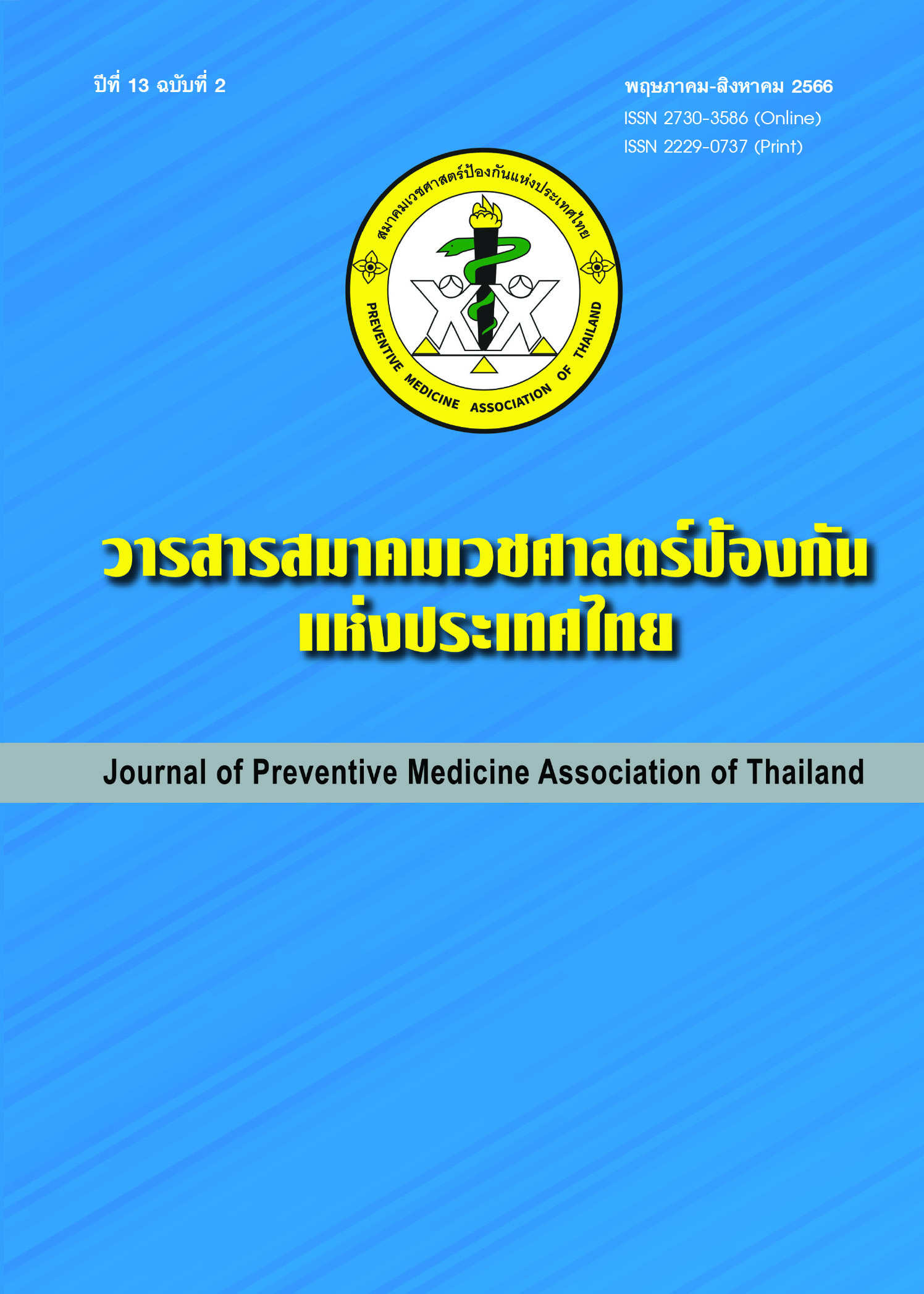The Association Between Substance Use Disorder Patients with Cognitive Impairment and Road Traffic Accidents
Keywords:
addicted patients, road traffic accidents, cognitive impairmentAbstract
Road traffic accidents, a global problem, tends to continuously increase in societies where vehicles are common modes of transportation. Factors such as human, vehicles and environmental have been associated with road traffic accidents. Drugs are one of the major causes of cognitive impairment resulting in traffic accidents. Objective: To study the association of drug addicts with cognitive impairment and road traffic accidents. Secondary objectives were to explore 1) factors contributing to road traffic accidents in drug addicts and 2) numbers and the proportion of substance used disorder patients with cognitive impairment. Methods: This study was a cross-sectional analytical study. Data were collected from all types of drug-addicted patients admitted to seven drug treatment facilities across the country. The sample consisted of 607 participants. The research tools were composed of five questionnaires, including personal characteristics questionnaire, Trail Marking Test A & B, the Stroop Color-Word test, Digit Symbol (WAIS-III) and road traffic accidents questionnaire. The Personal characteristics and road traffic accident questionnaires were validated by three independent experts and the value for Cronbach's alpha efficiency was 0.88. The other sets of questionnaires were the standardized psychological tests. Data were analyzed and presented by descriptive statistics, comprising frequency distribution, percentage, mean, standard deviation, and analytical statistics, comprising chi-square test (c2), Fisher's exact test, odds ratio and 95%CI. Data were collected between October 15, 2022 - January 31, 2023. Results: Factors affecting road traffic accidents were driving experience with less than 20 years, by which road traffic accidents were reported as high as 18.3% and had a statistically significant relationship with road traffic accidents at the .05 level. The top three most addictive drugs that caused cognitive impairment were methamphetamine, alcohol and heroin at 43.7%, 23.6% and 2.1%, respectively. Patients who used methamphetamine, alcohol and heroin had 2.34, 2.30 and 0.44 times the odds for cognitive impairment, respectively than that of patients using other drugs. Conclusion: The results of this study did not find an association between cognitive impairment and a history of road traffic accidents. However, it was found that methamphetamine and alcohol dependence patients were more likely to have cognitive impairment than of patients using other drugs.
References
United Nations Office on Drugs and Crime (UNODC). World Drug Report 2021. Vienna Austria: United Nations Office on Drugs and Crime (UNODC); 2022.
มานพ คณะโต, กนิษฐา ไทยกล้า, สาวิตรี อัษณางค์กรชัย, จิตรลดา อารียสันติชัย, ศยามล เจริญรัตน์, พูนรัตน์ ลียติกุล และคณะ. รายงานผลการการสำรวจครัวเรือนเพื่อคาดประมาณจำนวนประชากรผู้ใช้สารเสพติดของประเทศไทย ปี พ.ศ. 2562. กรุงเทพฯ: บริษัทจรัลสนิทวงศ์การพิมพ์ จำกัด; 2562.
วิโรจน์ วีรชัย. เส้นทางสู่การติดยาและหนทางสู่การเลิกยาเสพติด. ใน:วิโรจน์ วีรชัย, อังกูร ภัทรากร, ล่ำซ่ำ ลักขณาภิชนชัช, ฉวีวรรณ ปัญจบุศย์, นิภา ณีสกุล, บรรณาธิการ. ตำราการเวชศาสตร์การเสพติด. กรุงเทพฯ: สำนักงานกิจการโรงพิมพ์องค์การสงเคราะห์ทหารผ่านศึก; 2548. หน้า 132-45.
สำนักพัฒนาระบบข้อมูลข่าวสารสุขภาพ. ก้าวสู่ทศวรรษความปลอดภัยทางถนน. ใน: จดหมายข่าว“ต้นคิด” รายเดือน [อินเทอร์เน็ต]. 2554 [เข้าถึงเมื่อ 29 พ.ค.2565]. เข้าถึงได้จาก: http://www.hiso.or.th/hiso/ picture/reportHealth/tonkit31.pdf.
ศูนย์อุบัติเหตุทางถนนเพื่อเสริมสร้างวัฒนธรรมความปลอดภัย. ทศวรรษที่สองของการดำเนินการเพื่อความปลอดภัยทางถนน 2021 – 2030 [อินเทอร์เน็ต] 2565. [เข้าถึงเมื่อ 29 พ.ค. 2565]. เข้าถึงได้จาก:https://www.thairsc.com/.
Bates ME, Bowden SC, Barry D. Neurocognitive impairment associated with alcohol use disorders: implications for treatment. Exp Clin Psychopharmacol 2002;10(3):193–212.
Hart CL, Marvin CB, Silver R, Smith EE. Is cognitive functioning impaired in methamphetamine users? : a critical review. Neuropsychopharmacology 2012;37(3):586-608.
World Health Organization. Global status report on alcohol 2019. Geneva: World Health Organization; 2019.
ศูนย์ข้อมูลสนับสนุนการจัดบริการสุขภาพ กระทรวงสาธารณสุข. ดื่มแล้วขับกับอุบัติเหตุทางถนน ปัญหาที่ยังคงท้าทายของไทย. [อินเทอร์เน็ต]. 2562. [เข้าถึงเมื่อวันที่ 29 พ.ค. 2565]. เข้าถึงได้จาก: https://hdcservice.moph.go.th/.
Elvik R. Risk of road accident associated with the use of drugs: a systematic review and meta-analysis of evidence from epidemiological studies. Accid Anal Prev 2013;60:254-67.
ธิดารัตน์ ศรีสุโข, เกสร ทมฑิตชงค์, ธนพงษ์ ขวัญคง, ทัศไนย วงศ์สุวรรณ, จิตรพันธ์ โพธิ์ไพโรจน์, จินตนา หะรินเดช. ความสามารถเชิงคิดความเข้าใจในผู้ป่วยเสพติดเมทแอมเฟตามีน. วารสารสวนปรุง 2546;19(1)24-34.
Huisingh C, Owsley C, Wadley VG, Levitan EB, Irvin MR, MacLennan P, et al. General cognitive impairment as a risk factor for motor vehicle collision involvement: a prospective population-based study. Geriatrics (Basel) 2018;3(1):11.
บุญยืน ศรีสว่าง.แนวโน้มอุบัติเหตุทางถนนและความสัมพันธ์กับปัจจัยเสี่ยงที่เกี่ยวข้องกับอุบัติเหตุทางถนนเขตพื้นที่อำเภอสิชล จังหวัดนครศรีธรรมราช. วารสารวิชาการแพทย์ เขต 11 2561;32(4):1451- 61.
Fitzpatrick Kay, Carlson PJ, Wooldridge MD, Brewer MA. Design factors that affect driver speed on suburban arterials research report: Texas : Texas Transportation Institute; 2000.
พรรณี สุรินทชัย. การเกิดอุบัติตุจราจรและปัจจัยที่มีความสัมพันธ์กับระดับความรุนแรงของการบาดเจ็บในเขตอำเภอเมือง จังหวัดพะเยา. วารสารการพยาบาล การสาธารณสุขและการศึกษา 2557;1:3-14.
Spengler K, Babika C, Sterk V, Yassin SS, Golden CG. A-65 * Stroop Test as a predictor of driving mistakes. Arch Clin Neuropsychol 2014;29(6):527. doi:https:// doi.org/10.1093/arclin/acu038.65.
จุฑามาศ แหนจอน. จิตวิทยาการรู้คิด (Cognitive psychology). กรุงเทพฯ: แกรนด์พอยท์; 2561.
Oscar-Berman M, Shagrin B, Evert DL, Epstein C. Impairments of brain and behavior: the neurological essects of alcohol. Alcohol Health Res World 1997; 21(1):65-74.
Liappas I, Theotoka I, Kapaki E, Ilias I, Paraskevas GP, Soldatos CR. Neuropsychological assessment of cognitive function in chronic alcohol-dependent patients and patients with alzheimer's disease. In Vivo 2007;21(6):1115-18.
ศรัณย์ กอสนาน. กลไกและปัจจัยทางชีววิทยาที่มีผลต่อการติดสารเสพติด. วารสาร มฉก.วิชาการ 2547;8(15):83-93.
Mehmedic Z, Chandra S, Slade D, Denham H, Foster S, Patel AS, et al. Potency trends of Δ9-THC and other cannabinoids in confiscated cannabis preparations from 1993 to 2008. J Forensic Sci 2010;55(5):1209-17.
Somayeh M, Solat N, Banihashem SS, Kheradmand A, Mohammadi SD, Chalakinia N. Cognitive function methadone maintenance patients compared with abstinent opioid users. J Addict Dis 2021;39(4):537-44.
Meier MH, Caspi A, Ambler A, Harrington H, Houts R, Keefe RSE, et al. Persistent cannabis users show neuropsychological decline from childhood to midlife. Proc Natl Acad Sci U S A 2012;109(40):E2657-64.
Downloads
Published
How to Cite
Issue
Section
License
Copyright (c) 2023 Journal of Preventive Medicine Association of Thailand

This work is licensed under a Creative Commons Attribution-NonCommercial-NoDerivatives 4.0 International License.
บทความที่ลงพิมพ์ในวารสารเวชศาสตร์ป้องกันแห่งประเทศไทย ถือเป็นผลงานวิชาการ งานวิจัย วิเคราะห์ วิจารณ์ เป็นความเห็นส่วนตัวของผู้นิพนธ์ กองบรรณาธิการไม่จำเป็นต้องเห็นด้วยเสมอไปและผู้นิพนธ์จะต้องรับผิดชอบต่อบทความของตนเอง






